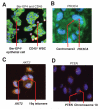The association of PI3 kinase signaling and chemoresistance in advanced ovarian cancer
- PMID: 22556379
- PMCID: PMC4630857
- DOI: 10.1158/1535-7163.MCT-11-0996
The association of PI3 kinase signaling and chemoresistance in advanced ovarian cancer
Abstract
Evidence that the phosphoinositide 3-kinase (PI3K) pathway is deregulated in ovarian cancer is largely based on the analysis of surgical specimens sampled at diagnosis and may not reflect the biology of advanced ovarian cancer. We aimed to investigate PI3K signaling in cancer cells isolated from patients with advanced ovarian cancer. Ascites samples were analyzed from 88 patients, of whom 61 received further treatment. Cancer cells were immunomagnetically separated from ascites, and the signaling output of the PI3K pathway was studied by quantifying p-AKT, p-p70S6K, and p-GSK3β by ELISA. Relevant oncogenes, such as PIK3CA and AKT, were sequenced by PCR-amplified mass spectroscopy detection methods. In addition, PIK3CA and AKT2 amplifications and PTEN deletions were analyzed by FISH. p-p70S6K levels were significantly higher in cells from 37 of 61 patients who did not respond to subsequent chemotherapy (0.7184 vs. 0.3496; P = 0.0100), and this difference was greater in patients who had not received previous chemotherapy. PIK3CA and AKT mutations were present in 5% and 0% of samples, respectively. Amplification of PIK3CA and AKT2 and deletion of PTEN was seen in 10%, 10%, and 27% of samples, respectively. Mutations of PIK3CA and amplification of PIK3CA/AKT2 or deletion of PTEN did not correlate with levels of p-AKT, p-p70S6K, and p-GSK3β. In patients with advanced ovarian cancer, there is an association between levels of p-p70S6K and response to subsequent chemotherapy. There is no clear evidence that this is driven specifically by PIK3CA or AKT mutations or by amplifications or deletion of PTEN.
©2012 AACR.
Figures


References
-
- Parkin DM. Global cancer statistics in the year 2000. Lancet Oncol. 2001;2:533–43. - PubMed
-
- Cooke SL, Brenton JD. Evolution of platinum resistance in high-grade serous ovarian cancer. Lancet Oncol. 2011;12:1169–74. - PubMed
-
- Yap TA, Carden CP, Kaye SB. Beyond chemotherapy: targeted therapies in ovarian cancer. Nat Rev Cancer. 2009;9:167–81. - PubMed
-
- Altomare DA, Wang HQ, Skele KL, De Rienzo A, Klein-Szanto AJ, Godwin AK, et al. AKT and mTOR phosphorylation is frequently detected in ovarian cancer and can be targeted to disrupt ovarian tumor cell growth. Oncogene. 2004;23:5853–7. - PubMed
-
- Yuan ZQ, Sun M, Feldman RI, Wang G, Ma X, Jiang C, et al. Frequent activation of AKT2 and induction of apoptosis by inhibition of phosphoinositide-3-OH kinase/Akt pathway in human ovarian cancer. Oncogene. 2000;19:2324–30. - PubMed
Publication types
MeSH terms
Substances
Grants and funding
LinkOut - more resources
Full Text Sources
Medical
Molecular Biology Databases
Research Materials
Miscellaneous

